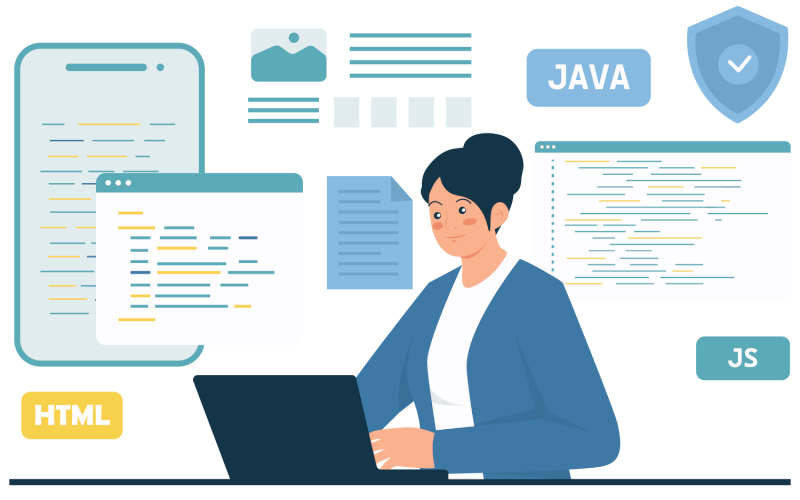Upgrading Business Software: Off the Shelf or Something More?
When it comes time to upgrade the software for your business, the first step many business owners take is to search the web. One of the first things that pops up is ready-made software, also known as off the shelf computer software. It can seem like a fast and simple solution. But while these products can appear to tick all the boxes, it is important to understand the disadvantages of off the shelf software before deciding.

In this post, we’ll take a closer look at what off the shelf computer software really means, the most common disadvantages of off the shelf software, and how custom solutions from BSPOKE Software might be a better long-term fit for your business.
What is Off the Shelf Computer Software?
Off the shelf computer software is software that is mass-produced and sold to a wide range of businesses. It’s designed to serve general needs rather than the unique needs of a single company. This kind of software is ready to install, often comes with help guides, and may be supported by the vendor.

Many types of off the shelf computer software are built for specific industries or to carry out particular tasks. Here are some examples:
Industry-specific software:
- Hospital management systems – These include patient records, appointment scheduling, and billing features all in one. However, different clinics often work in different ways, which this type of software may not fully support.
- Retail point of sale (POS) systems – This helps with managing stock levels, till transactions, and basic reports. But if your shop uses unique pricing rules or loyalty schemes, you might find the software too limiting.
- Construction project management tools – These can track labour hours and materials but may not link with every type of planning tool or on-site equipment you use.
Industry-specific software:
- Bookkeeping software – Designed to manage accounts, invoices, and expenses. Great for standard accounts but can become frustrating if your business has non-standard reporting needs.
- Customer relationship management (CRM) software – Helps track leads, customers, and communications. These are useful but may not handle the unique way you follow up with clients.
- Time-tracking apps – Used by service companies to monitor hours worked. But often these don’t link well with payroll or invoicing systems, leading to more manual work.
Disadvantages of Off the Shelf Software
While off the shelf computer software may sound convenient, there are important disadvantages of off the shelf software to consider:
🧱 Limited Fit for Specific Needs
Off the shelf computer software is built for the general market. This means it often includes features that are not relevant to your business, while lacking the ones you actually need. Trying to make it work for your specific processes can lead to inefficiencies and mistakes. You might end up changing your workflow just to suit the software.
💸 Rising Costs Over Time
At first glance, off the shelf computer software seems affordable. But the real costs build over time. Licences, extra user accounts, plug-ins, integrations, and support all add up. You may also need to buy extra tools just to complete everyday tasks, leading to higher monthly bills and more complexity. These hidden costs are a major disadvantage of off the shelf software.
🔁 Forced Workflow Changes
You may have to adapt your business to fit the software, instead of the software fitting your business. This can cause confusion among staff, especially if they need to learn new, unfamiliar steps. These changes can slow down productivity and result in errors.
🔐 Vendor Control and Risk
With off the shelf computer software, your business relies on decisions made by the vendor. If the vendor ends support for your version, you might need to upgrade. This could mean extra training, new hardware, or dealing with changes that make your current processes harder.
🔗 Compatibility and Integration Problems
Different systems often struggle to communicate with each other. For example, your accounting software might not connect to your stock control system. Staff might need to enter the same information into multiple systems, increasing workload and errors. This is one of the key disadvantages of off the shelf software.
🛡️ Security Concerns
Because popular software is widely used, it attracts cyber threats. People often find security flaws quickly, and your business must wait for the vendor to fix them. This can leave you vulnerable during that time.
A Closer Look at Costs and Compatibility
Let’s consider a fictional clothing manufacturer with around 100 employees: 20 working in admin roles and the rest on the factory floor or in the warehouse. They use off the shelf computer software to handle daily tasks like accounting, customer orders, and inventory.

To manage their operations properly, they may need the following software systems:
- Accounting software – for payroll, tax, invoicing, and supplier payments
- Inventory management – to track raw materials, packaging, and finished goods
- Customer relationship management (CRM) – for handling enquiries, sales, and support
- Warehouse management software (WMS) – to oversee stock locations, pick and pack, and delivery tracking
- Production scheduling software – to plan manufacturing runs, shift times, and equipment use
Here’s how the pricing could look based on 2025 estimates:
| Software | Users | User Costs/Month | Full Yearly Costs | Purpose |
|---|---|---|---|---|
| Accounting (e.g. Xero) | 5 | £32 | £1,920 | Task-specific |
| Inventory (e.g. Cin7) | 10 | £75 | £9,000 | Task-specific |
| CRM (e.g. Zoho) | 5 | £40 | £2,400 | Task-specific |
| Warehouse (e.g. Zoho WMS) | 10 | £99 | £7,800 | Industry-specific |
| Production (e.g. Katana MRP) | – | £99 | £5940 | Industry-specific |
| Add-ons & Integrations | – | £100+ | £1200+ | – |
| Support Services | – | £100 | £1200 | – |
| Total | Over £29,460/year |
And these are just the base software costs. They don’t include:
- One-off setup fees
- Time spent training staff across multiple systems
- Hiring IT staff or external developers to patch together different tools
To help show the real challenges of using off the shelf software, here are two simple examples. These show how using separate systems can affect your business every day, and where custom software could be a better option.
- Your production planning might not link with your warehouse system. So, after finishing an order, someone has to manually update the stock levels.
- If your CRM doesn’t connect to production, customer delivery dates could be missed.
These gaps can lead to confusion, duplicated effort, and costly errors, all common disadvantages of off the shelf software. Custom software fixes this by bringing everything together in one system that matches how your business works.
Custom Software vs Off the Shelf Computer Software


This table gives a quick comparison between off the shelf computer software and custom software:
| Off the Shelf Computer Software | Custom Software |
|---|---|
| 💰 Lower initial cost | Higher cost at first, but saves money long term |
| ⏱️ Ready to use quickly | Takes longer, but built in clear steps with support |
| 💠 Fixed features and setup | Tailored to your business and industry |
| 🧩 Vendor decides updates and changes | You own it and choose how and when to update |
| 🧑💻 Support from vendor or community | Help direct from the people who built it |
| 🔄 Limited integration | Links well with your other systems |
| 📦 High risk of outgrowing software | Grows with your business over time |
| 📁 Harder to migrate data | Your developers can safely move your data |
| 🏭 One-size-fits-all | Made to suit your sector perfectly |
Let’s Break Each One Down
💰 Lower initial cost vs higher upfront cost:
Off the shelf software has a lower starting price because it’s shared across many users. You pay more upfront for custom software because it’s built specifically for your business. But it offers long-term value; you won’t need to keep buying new tools as your business grows, and it avoids wasted spending on unused features. You also own your system outright, which reduces licence and subscription costs in the future.
⏱️ Ready to use vs fully tailored (built in phases):
Off the shelf software is quicker to install because it’s pre-made. But adapting it to your workflow can be difficult, with extra setup and training. It takes more time to build custom software, following clear steps like planning, building, testing, and launching; with expert help all the way. This makes adoption smoother for your team.
💠 Fixed features vs flexibility:
With off the shelf software, what you see is what you get. You can request changes, but you’re at the mercy of the vendor. With custom software, the features are tailored to your business and industry. You get what you need; no more, no less; which improves workflow and reduces confusion. The software evolves with you as your needs change.
🧩 Vendor control vs ownership:
Vendors of off the shelf software often stop supporting older versions. You may be forced to update, retrain your staff, or buy new licences. Custom software is yours. You own the code and intellectual property rights, so you decide who updates your software and when. On top of this you get to choose where your software is hosted, whether on the cloud or your own servers.
🧑💻 General support vs direct help:
Off the shelf products often come with limited or declining support. To get full help, you may need to upgrade to the latest version. Custom software companies can offer direct access to the developers who built your system. The development team gives you dedicated support after launch, helping with fixes, upgrades, and new features.
🔄 Limited integration vs strong integration:
Off the shelf systems don’t always play well with your other tools. Whereas custom software can be designed to link easily with your current systems; like finance, stock control, and HR; this means your system can continue to run smoothly.
📦 Risk of outgrowing software vs long-term scalability:
Many off the shelf tools can’t keep up as your team or processes grow. Custom software is built to scale, so it works for you now and continues to work in the future, no matter how your business evolves.
📁 Harder to migrate data vs safe data migration:
Switching from one off the shelf system to another can lead to data being lost or becoming messy. With custom software, the developers can move your data safely and accurately, without disrupting your daily work. Because they’ve built your new system, they understand exactly how your data is structured, making the move much easier.
🏭 Generic software vs industry-specific fit:
Off the shelf software often tries to serve many sectors, which can leave gaps in how well it works for your business. Reputable custom software developers will take the time to get to know your industry; whether you’re in manufacturing, retail, healthcare, or something else. This helps them build software that fits your operations exactly and supports your unique needs.
At BSPOKE Software, we’re open and honest. If we believe off the shelf computer software would be the right choice for your needs, we’ll tell you. We believe in transparency and helping you make the best choice for your business.
When Off the Shelf Computer Software Works Well
There are times when off the shelf computer software is a suitable choice. It works well if your business:
- Has standard, well-known processes
- Needs quick implementation
- Prefers lower risk and fixed costs
- Doesn’t require specialist integration or security
But as businesses grow or become more specialised, these benefits can often become disadvantages of off the shelf software. Inflexibility, higher long-term costs, and lack of control start to hold your business back.
Why BSPOKE Software Custom Solutions Make a Difference
At BSPOKE Software, we offer more than just code – we offer solutions that fit your business.
Here’s a quick reminder of the key benefits of custom software, that we can provide:
- Tailored features – Built to match your needs and how your team works
- Strong integration – Connects smoothly with your existing systems
- Data migration – We safely move your data from old tools
- Your own code – You fully own the software and control updates
- Dedicated support – Ongoing help from the people who built it
- Hosting options – Run it in the cloud or on your own servers
- Phased development – Built in clear steps with your input
- Fits any industry – Designed to suit your sector, whatever it may be
Choosing custom over off the shelf computer software means choosing a system that fits your business perfectly, with none of the common disadvantages of off the shelf software.

However, at BSPOKE Software, during your first conversation or software consultation, we’ll listen to your goals. If we believe off the shelf computer software will work well for you, we’ll say so. We are always transparent and will explain why. But if custom software will serve you better, we’ll explain that clearly too, along with the reasons why.
Making the Right Choice
Before you search for off the shelf computer software or a custom software company, take a moment to think about the following:
- Do your processes follow standard patterns?
- Do you need to get started as quickly as possible?
- Are you happy using software that many others also use?
- Do you plan to stay small, with no major changes in how you operate?
If you answered no to any of these, the disadvantages of off the shelf software may end up costing you more in the long run. In that case, a custom-built solution might be the smarter investment. It may take more time and planning upfront, but it’s built to support your business, not hold it back.
Key Takeaways
Let’s quickly go over the main points again:
- Off the shelf computer software is easy to access and often cheaper to begin with.
- The disadvantages of off the shelf software include poor fit, lack of flexibility, hidden costs, and limited control.
- Custom software, like that from BSPOKE Software, is tailored, scalable, and supported by the people who built it.
- Making the right choice depends on where your business is now and where you want it to go.
If you’re unsure whether off the shelf computer software or a custom solution is best, talk to us at BSPOKE Software. We’re here to help you find the right path for your business – no pressure, just honest advice.

